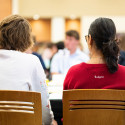Community service fellowships available to undergraduates
Undergraduate students, faculty and staff have a new opportunity to forge community service partnerships with area nonprofit and government agencies through the university’s Morgridge Center for Public Service.
The Wisconsin Idea Undergraduate Fellowships (WIFs) will fund undergraduate-originated community service projects, carried out with the help of UW–Madison faculty and staff.
According to Susan Vande Hei Dibbell, Morgridge Center director, the fellowships have been created to widen two-way benefit streets between students at the university and other communities in the best tradition of the Wisconsin Idea.
“The fellowships make it possible for students to enhance their resumes with applied research experience, share their knowledge, gain a greater understanding of community issues, improve communication skills and build self-confidence,” she says.
The WIF application deadline is Feb. 5.
Meanwhile, the center is administering a number of student-initiated projects through grants from Reebok and the UW–Madison Provost’s Office. Activities carried out during the 1998-99 academic year include a weekly tutoring program forTibetan children and adults in Madison and an experiential learning program focusing on communication and related skills. Next semester, students taking a seminar in the UW–Madison School of Human Ecology will develop and implement a service-learning program.
The grants also support an “Eat Smart” program. Three UW–Madison nutritional science students will design a nutrition education curriculum for low- income five-to-eight year-olds who eat meals at the Wil-Mar Neighborhood Center. Brad Ferguson, a member of the “Eat Smart” team, is finding that the project is providing practical applications for what he’s learned in his classes.
“It’s not that easy to eat right. These children often live in single-parent households, or with some other relative, like an aunt,” Ferguson says. “Whatever adult is there does the grocery shopping and meal preparation,” and nutritious meals often become a secondary concern, he says.
The students expect to put their curriculum into play next semester. However, Noel d’Albert, Wil-Mar youth director, says even in these early stages she notices a positive effect. Wil-Mar serves breakfast, lunch and a 3 p.m. snack, “family style, so food is not portioned out. The kids need to be aware of good nutrition, and those that have some nutritional information are more willing to take helpings of vegetables,” d’Albert says.
Dibbell says “Eat Smart” and the other projects funded by Reebok and the Provost’s Office might inspire students interested in a Wisconsin Idea Undergraduate Fellowship. For more information about the fellowships or volunteer opportunities in general, contact the Morgridge Center at 263-4009.
Tags: learning




